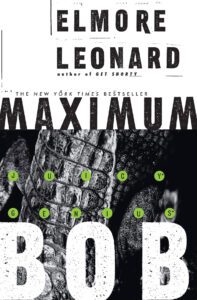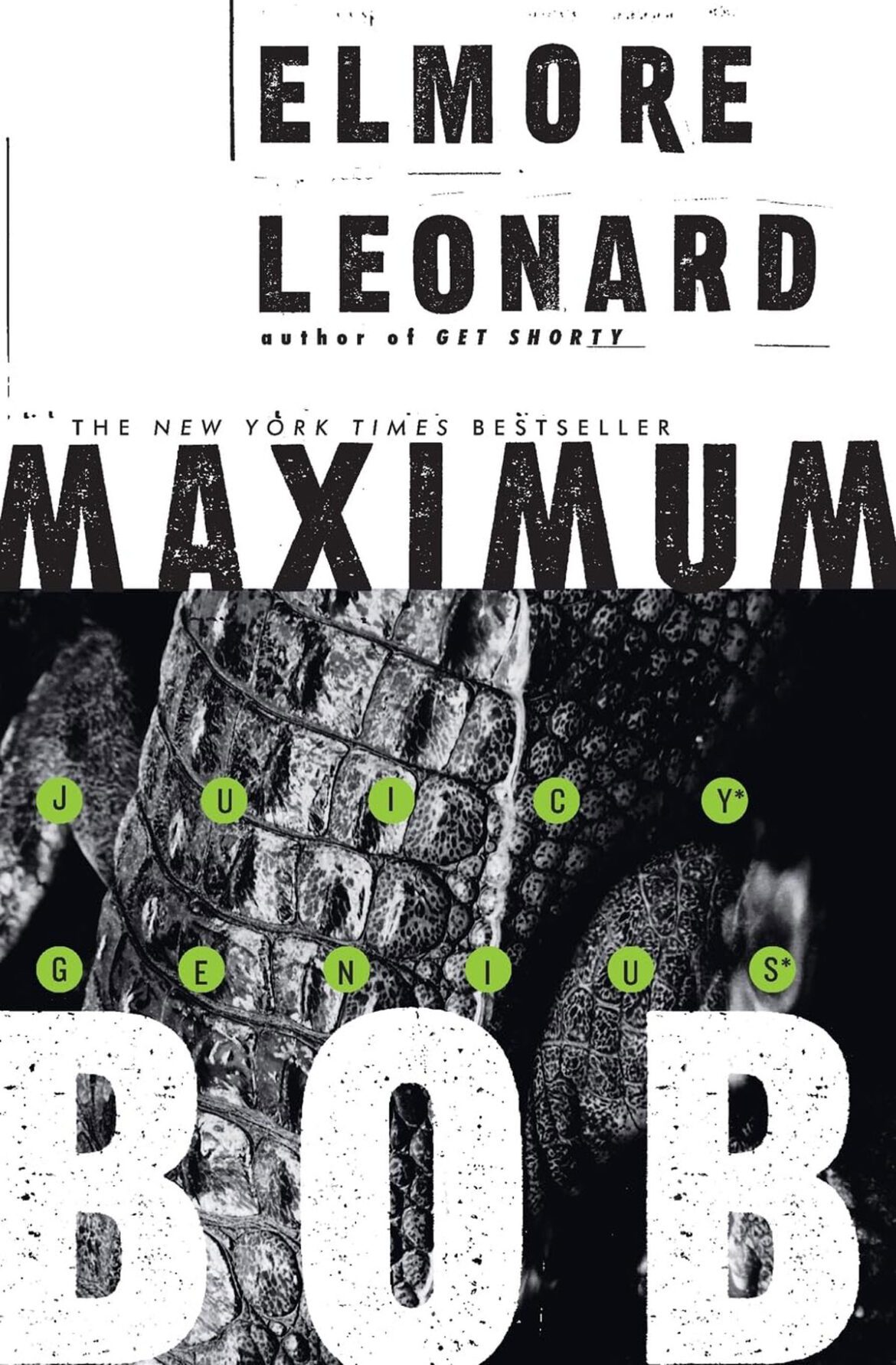
Author: Elmore Leonard
Publication Year: 1991
Length: 352 pages
I’ve somehow gone my entire life without reading an Elmore Leonard novel. Sure, I’ve seen the multitude of his books and stories that have been adapted for film and TV, but I’ve never sat down and read his prose. Which is weird, considering that the mix of all that makes up a Leonard narrative seems right up my alley. So, why did I start with Maximum Bob? I’m honestly not sure, but it probably had something to do with Amazon dropping the price down to .99 and it just seemed like the time to read about some comic capers. Considering everything in the world that’s going on right now that’s so unfunny. Thing is… I didn’t find this story so humorous. I think it was supposed to be, but perhaps Leonard isn’t so much my thing as I thought he might be.
What do we think about the “n-word” in 2025? I don’t mean the meaning or implication of a white dude using the word, of course. I mean seeing it in print. Uttered by a white guy. Written into his mouth by a white guy. And, sure, maybe this is how Floridians spoke in 1991, or still speak to this day. But it stopped me in my tracks. And I’m not trying to be a delicate flower here, but it just felt… weird. And unnecessary. Because I was under the impression Leonard wrote comedic stuff. Goofy stuff. Character-driven stuff that was maybe a little absurd and relatively innocuous. And, sure, maybe I was confusing him with Carl Hiaasen, the other author who writes humorous crime fiction set in Florida. I don’t think Hiaasen would use the n-word. Nor would he have rapey, despicable dudes who pretty much go unpunished. Of course I’ve never read a Hiaasen novel either. But his book covers are adorable. The whole point is, I didn’t think I was walking into a James Ellroy book. And while it’s not as nihilistic, deeply fascistic or gonzo as that, Leonard’s prose definitely skews more gruff and gritty than sentimental. His okay-ness with his characters who display pretty despicable behavior a signal that he’s not bestowing judgement, but just telling it like it is. Guy throws around racial epithets — what’s he gonna do about it?
I think I can say that my sensibilities when it comes to “humor” are not Leonard’s. This was not a funny book. And, no, I don’t think it’s meant to be funny per se, but I think Leonard was going for a wry smile. A nod to his cleverness. From his description of a tough guy who doesn’t consider his prison sexcapades “gay” or the actual gay characters flaunting their, uh, gayness, to the novel’s namesake, Robert “Maximum Bob” Gibbs being a serial sexual harasser, I can’t say any of these things triggered even the slightest grin from me. Cringe, yes. Smile, no. Shit, I don’t know, maybe this wasn’t supposed to be the “humorous” side of his writing, but something tells me this is what passed for humor in the early 1990s when maybe these things were just more acceptable or somehow considered funny-ish? Again, I don’t think he was going for LoLs, but certainly was aiming for something that hasn’t aged particularly well 35 years on.
Putting all of that aside and focusing on the story, it’s not one that particularly spoke to me. There’s this judge Bob Gibbs (known in the book as “Big” and not Bob, oddly). He’s known for being a hard-ass who gives criminals maximum sentences. Get it? On the other side there’s a probation officer named Kathy Baker. He’s old and lecherous. She’s young and hot. They get entwined when one of his former defendants, whom he sent to prison (he is Maximum Bob, after all), ends up as one of her parolees. There are some shenanigans and said parolee goes from a good-ole-boy jerkoff to what amounts to a rampaging murderer. Kathy and her new cop boyfriend are on the case to stop him, with his ultimate target being the judge who put him away, the one and only Maximum Bob. The thing is, Leonard seems very interested in telling us who this baddy, Elvin Crowe, is, but seems less interested in developing his other characters. Like Kathy’s new beau, Officer Gary Hammond, who has potential and is built up as a critical cog, but is ultimately cast off with almost little-to-no fuss from the author or his supposed amour, Kathy. It’s as if Leonard just kind of lost interest in him because he was so “normal” and just wrote him off. Also, Maximum Bob’s reputation of being this hanging judge is never really enforced. We just have to take the title’s word for it. Honestly, he just seems more like a drunk asshole who is more interested in scoring than a guy who has a POV about criminals and criminal behavior. Another character tries crack once and becomes an all-of-a-sudden crackhead. Bob’s estranged wife seems to have a small slave girl living inside her consciousness who speaks through her for no apparent reason… This is all to say, there are a lot of leaps here with not a whole lot of consideration for motivation, reputation or repercussion.
They made a TV series out of this novel back in 1998. It doesn’t look to be streaming anywhere other than on YouTube. But it looks pretty terrible. A core and identifying part of Kathy Diaz Baker’s character is that she’s Cuban and “speaks with a slight Hispanic accent.” You can imagine what the racist judge makes of that. Seems, though, they hired a nice white lady to play her on the show. Also, Bob’s crystal-having, hippie wife looks like a 50s homemaker. And, worst of all, it sounds like they have the aforementioned slave girl doing voiceover narration inside the episodes? In 1800s patoi, no less. Ooof, the 90s were a crazy time. Needless to say, the series didn’t get renewed for a second year. Not that a TV adaptation should be any reflection on the original novel, but they clearly thought the characters were interesting enough to make a show out of them. I wonder if the crack-addict prostitute, junkie doctor on house arrest and his “cabana boy” make an appearance? Somehow I don’t think ABC was down with that.
Look, your enjoyment here all comes down to your tolerance for making logic leaps in plotting and generally filling in the holes Leonard has left with a “let’s just go with it” attitude. Because these characters are a bit cartoonish and not prone to actual human reactions to their surroundings. They’re not the clever criminals — or even the clever heroes — we’re used to dealing with in most of our stories. I could be generous and say they’re flawed and realistic in their scattered allegiances and poor decision making, but that would be short-cutting my criticism that the characters can feel a bit cardboard and shallow in their motivations and reactions to situations that would otherwise cause some serious trauma and upset. It’s too reality-based to be absurdist (aside from the whole slave-girl spirit thing), but in some cases the situations and emotions border on it. The novel can be entertaining at times, but left me a bit cold when it just kind of petered out on the final page.


